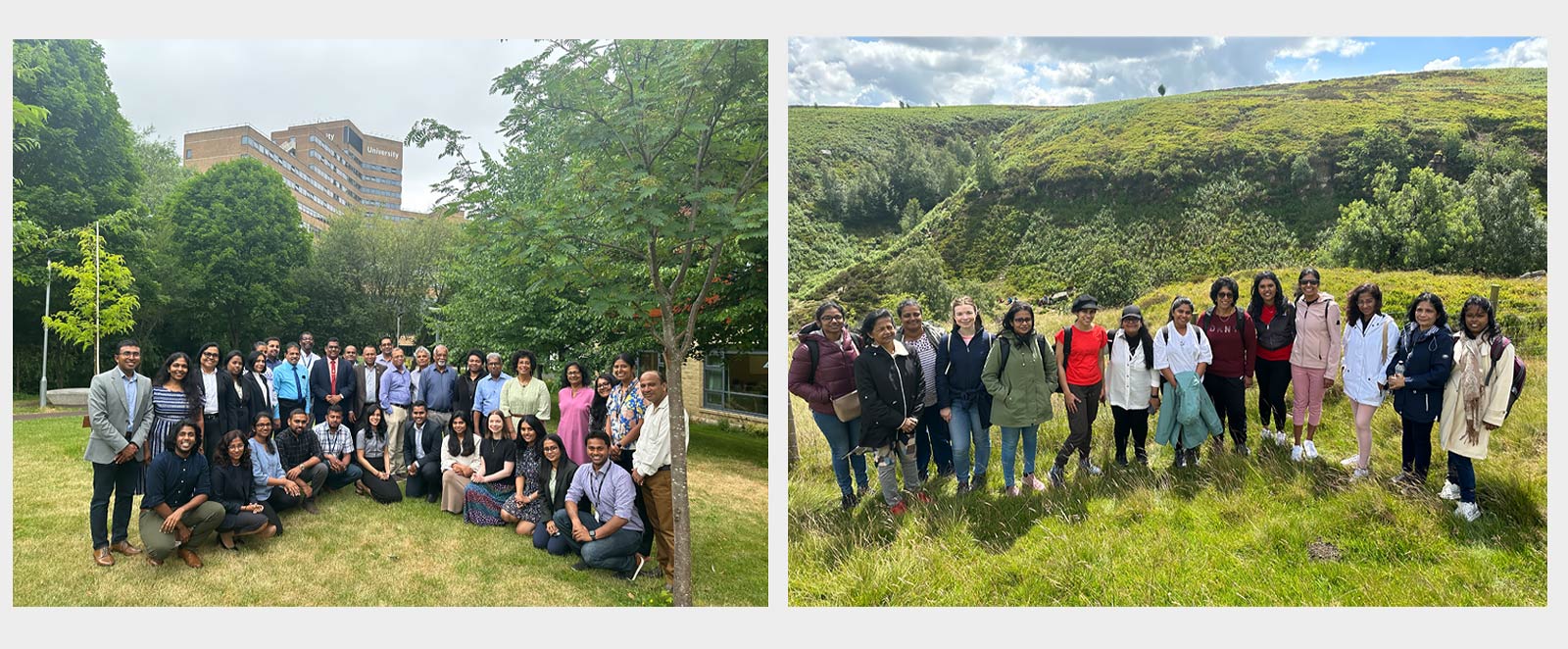Climate change is expected to continue to drive disaster risk, with significant increases in the frequency, intensity, spatial extent and duration of extreme events. One of the countries most impacted has been Sri Lanka which has suffered heavily due to extreme weather events. In the Climate Risk Index for 2017 it was ranked number two in the world for being the most affected country in the world.
Now, a staff exchange programme has taken place between the University of Huddersfield and eight prestigious Sri Lankan universities for the 'Research Training Network on Tackling Climate Change as an Underlying Disaster Risk Driver' to work towards tackling climate change as an underlying disaster risk driver. The event was the first of its kind to feature the collaboration of a such a varied and multidisciplinary team between the two countries.
The network is part of an Erasmus+ International Credit Mobility (ICM) project titled 'Climate Change Adaptation and Disaster Risk Reduction' (CCA-DRR) and featured 24 academics including engineers, architects, sociologists, management experts, climate scientists, Geographers, Disaster Risk Reduction experts, agriculture and food scientists from the Sri Lankan universities Moratuwa, Colombo, Peradeniya, Ruhuna, South Eastern, Sri Jayewardenepura, Kelaniya, and Sabaragamuwa.
Led by the Global Disaster Resilience Centre's Dr Chamindi Malalgoda with GDRC Co-Directors Professor Dilanthi Amaratunga and Professor Richard Haigh, the training network was designed to develop research capacities amongst senior academic staff members from UK and Sri Lanka.
 Pictured above are the delegates from Sri Lanka who took part in the staff exchange programme alongside the team from the University's Global Disaster Resilience Centre.
Pictured above are the delegates from Sri Lanka who took part in the staff exchange programme alongside the team from the University's Global Disaster Resilience Centre. The aim was to advance the dialogue between the CCA and DRR research communities by investigating differences, overlaps and potential synergies between the two realms. This was achieved through a structured programme drawing together international expertise and diverse disciplinary perspectives with seminars, workshops, an international symposium, panel discussions, guest lectures, the planning of research papers, the development of a research road map, and field trips.
Prior to the launch of the training network an international symposium also took place featuring 37 research presentations structured across five key themes and two panel discussions. The key themes included climate change action for resilience in agricultural and food systems, climate change adaptation for coastal ecosystems and flood management, business continuity, policy and governance, climate change adaptation in the built environment and climate change risk management.
The feedback received from the delegates included comments such as:
"Thank you for everything you have done for us. You are the live wire for us not only for building our capacities towards CCA-DRR but also for networking with each other internationally as well within Sri Lanka. Your guidance and support are always admirable and appreciated."
Champa Navarathne
"This CCA-DDR programme has developed our capacity to work out in the field of climate change and disaster risk reduction which is a different and new field to exploit. Thank you to the team at the School of Arts and Humanities. I'm indebted to express my sincere thanks and gratitude to the GDRC for their hard work and commitment to make this programme a great success."
Abduk Majeed
The GDRC's Professor Amaratunga explained that a significant output from the CCA-DRR programme has been the development of a research roadmap to achieve climate change adaptation and disaster risk reduction in Sri Lanka focusing on built-environment, human health, transportation, energy, tourism, environment and eco-systems, water resources, food security, agriculture, and livestock sectors through an inter-disciplinary collaborative approach.
Several bi lateral meetings have also taken place between senior Sri-Lankan academics and the University's Deputy Vice-Chancellor Professor Tim Thornton and Pro Vice-Chancellor (Research and Enterprise) Professor Andrew Ball where further collaborative actions between the two countries were discussed.
"Research capacity development on CCA-DRR is one of the most critical challenges facing Higher Education Institutes in Sri Lanka," said Dr Malalgoda.
"The staff exchange programme has addressed some of the most pressing issues for researchers and universities in the context of building and sustaining research capacity.
"Eventually, it is expected that these gaps in the knowledge will be filled, providing better and timely recovery for disaster-affected communities. To help build resilience to climate and disaster risks, countries must be supported to identify and leverage relevant technical, financial, and organisational capacities in all sectors of society," she added.
- The CCA-DRR is a European Commission funded Erasmus+ International Credit Mobility (ICM) project which supports student and staff mobility to and from countries outside Europe.






